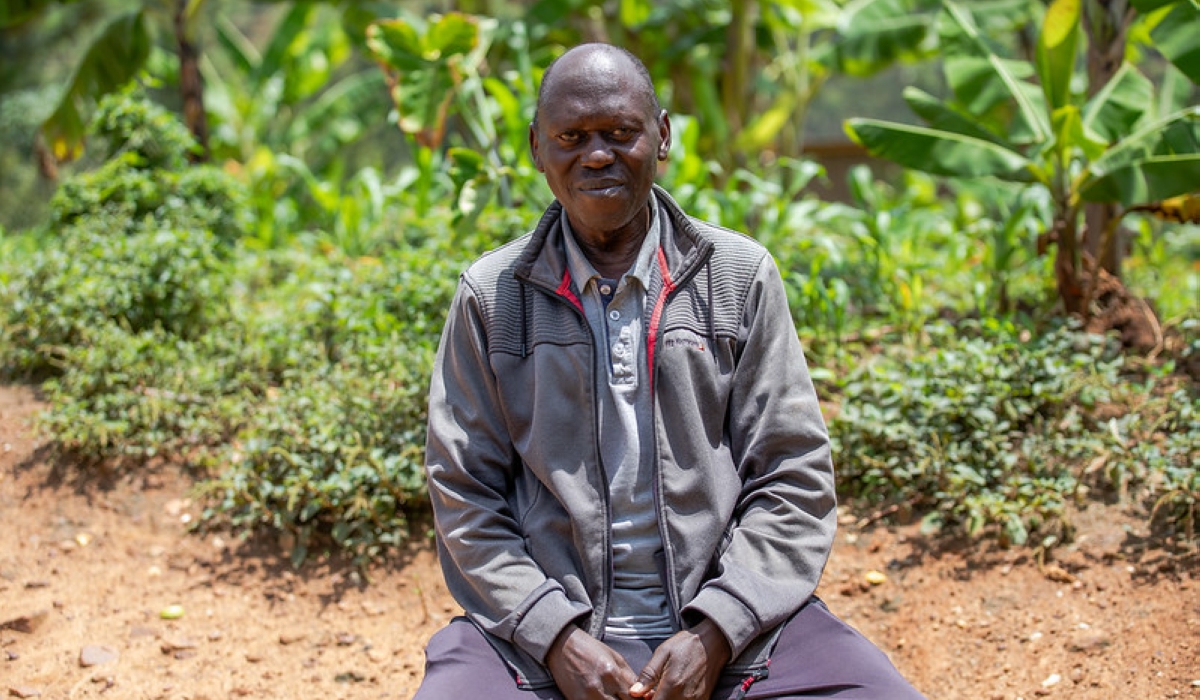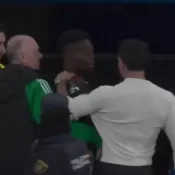
Former FDLR leader: The greatest threat to peace remains DR Congo’s backing of genocidal militias
There will never be peace in the Great Lakes Region as long as the genocidal FDLR is allowed to continue operating in the Democratic Republic of the Congo (DR Congo) with the full backing of the government.
Straton Musoni, a former vice president and co-founder of the terrorist militia, claims this. The militia was established following the 1994 Genocide against the Tutsi, when the Rwandan Patriotic Front (RPF-Inkotanyi) overcame the genocidal government’s forces and forced them to flee the country into what was then Zaire.
The defeated forces then gathered in what would later become the Democratic Republic of the Congo (DR Congo) to continue their agenda of genocide ideology, with full backing from the host nation. This began under Laurent-Désiré Kabila’s regime and continued under succeeding ones, including the current one headed by Félix Antoine Tshisekedi.
According to Musoni, unless Kinshasa condemns its backing of the militia and its members repudiate the philosophy of genocide and return home peacefully, this will always be a hindrance to efforts to bring about peace in the Great Lakes Region.
Musoni, who is currently residing in Rwanda after being deported from Europe after serving his prison sentence, stated in an interview with The New Times that peace can never be reached as long as there is no goodwill in Kinshasa to cease cooperation with the rebel organization.
Following a four-year trial on allegations of war crimes and crimes against humanity committed in eastern Democratic Republic of the Congo by the murderous militia they co-founded and headed, Musoni and his superior, Ignace Murwanashyaka, were sentenced to 21 years in prison by a German court in September 2015.
Musoni served eight years in prison in 2022 and was deported to Rwanda in October of the same year after spending nearly six years in pre-trial imprisonment and being kept confined to his home in Germany as he fought deportation to Rwanda.
Musoni now lives in seclusion in his ancestral home in Karama village, Mutandi cell, Mutete sector, Gicumbi District, Northern Rwanda. He relocated there after completing the demobilization and resettlement procedures, which were carried out by the Rwanda Demobilization and Reintegration Commission (RDRC), which repatriated many militias to Rwanda.
The elderly scholar and former financial controller, who was instrumental in the establishment of FDLR, which is still a major talking point in the ongoing conflict in the eastern part of the Democratic Republic of the Congo, lives a modest life in the country’s countryside and keeps a close eye on regional developments.
Musoni gave his thoughts on the situation in the country when The New Times paid him a visit. Musoni had devoted a large portion of his life to traveling back and forth between Europe and the Democratic Republic of the Congo in order to rally support for the armed group. He emphasized that peace will be difficult to attain as long as the murderous FDLR is functioning in the large country.
He does not hold back when explaining the importance of FDLR in the current conflict and why it is still the largest issue that the world ignores, which is not surprising coming from someone who was not only an insider but also an authority and a person of worldwide interest.
Musoni states unequivocally that the FDLR has the complete support of the government in the Democratic Republic of the Congo, highlighting the fact that without this support, the group would not be in existence or a threat. He goes on to say that Rwanda should be extremely concerned about its existence.
“The FDLR’s presence in the Democratic Republic of the Congo is still a major security concern for Rwanda,” he adds, adding that there have been prior instances of attacks by the FDLR that might destabilize the nation and the region.
Musoni, one of the militia’s organizers, claims that because the group continues to adhere to the same philosophy upon which it was founded, Rwanda has good reason to intervene in eastern DR Congo in order to eliminate any possible security risks.
The Rwandan government has the right to protect its national security, which he claims is non-negotiable, but he believes those who accuse Rwanda of getting involved in the situation in eastern DR Congo ignore how serious the issue is.
He adds that Rwanda has every right to defend itself as long as the militia upholds its genocide ideology stance and Kinshasa continues to support it. “If the FDLR were to disarm and return to Rwanda, there would be no further justification for conflict or a discussion on Rwanda’s involvement in DR Congo,” he says.
Once more, this comes from someone who played a key role in FDLR’s founding. Since the organization still has people based in the Democratic Republic of the Congo who were a part of Juvénal Habyarimana’s previous government and have cases to answer in Rwanda, he is adamant that Rwanda’s issues be handled.
Some of them participated in the Tutsi Genocide in 1994, yet they were never prosecuted. Although it’s unclear how many of the initial offenders are still at large, their existence still causes issues, Musoni says.
He claims that for the last thirty years, Rwanda has exhibited kindness and assisted in the disarmament and return of the FDLR to their homeland, with many of them having been demobilized and relocated.
Nonetheless, the group’s existence is sustained by the government of the Democratic Republic of the Congo’s ongoing assistance. He claims that although this was a successful approach to settling the issue, the largest barrier to peace is Kinshasa’s continued support of the militia for its own reasons.
DR Congo is in favor of maintaining FDLR
Many members would be willing to put down their weapons and return home to go through the demobilization and resettlement procedures if it weren’t for government assistance, according to Musoni, but there are a lot of competing interests.
He goes on to say that since the militia has historically fought with Congolese soldiers and been included into FARDC, there is little doubt that the DR Congo government works with the FDLR.
He claims that the Congolese government has depended on FDLR rebels for military operations for many years, and that this is an undeniable reality. “They have been used as auxiliary troops in conflicts within the Congo for decades,” he adds.
In response to those who contend that the FDLR is no longer a threat to Rwanda because of its waning power—many of its founders have returned to Rwanda or lost their lives fighting there—Musoni asserts that the militia is still active and that fresh recruits join it each year.
Musoni asserts that the FDLR issue should not be interpreted only in terms of the individuals who took part in the 1994 Genocide against the Tutsi, but also in light of the fact that even younger members who were recruited under the same philosophy joined after their birth.
The plan was to topple Rwanda’s government and carry out the extermination of the Tutsi population. “That ideology has remained constant,” he asserts.
The militia still exists and is a menace, even though it is not as organized or powerful as it previously was.
Many of its combatants have gone back to Rwanda, and some are participating in Mutobo’s rehabilitation programs. The FDLR hasn’t been totally eliminated, though.
In the Democratic Republic of the Congo, some components are still active in isolated wooded regions. “It is unlikely that a purely military solution will succeed in eliminating the FDLR entirely given the difficult terrain and lack of governance in these regions,” Musoni argues.
He contends that discourse and the DR Congo’s decision to cease supporting the group—which would open the door for their repatriation—are the long-term solutions to this problem. But it won’t happen anytime soon as long as they have support.
He also points out that the FDLR and other such organizations continue to think they can topple Rwanda’s government. Such an illusion will continue to be a barrier to peace notwithstanding Kinshasa’s assistance and assurances.
“There won’t be an end to this unless the remaining fighters accept their defeat and willingly return and reintegrate into Rwandan society,” he stated, adding that the FDLR’s existence has been maintained over the previous 20 years or so thanks in large part to assistance from the DR Congo.
“A viable course of action would be for FDLR members to demonstrate the willingness to disarm and return home to live in peace in Rwanda.” He emphasizes how the DR Congo’s assistance has been crucial to the group’s survival and preservation, saying, “However, any negotiation efforts will be futile if their objective remains the violent overthrow of the Rwandan government.”
Straton Musoni is who?
Musoni was born in Rulindo District’s Masoro Sector and later relocated to his grandfather’s hometown in Byumba, which is now in Gicumbi District.
He continued his education and finally found himself in Germany, where he accompanied Murwanashyaka in organizing opposition groups and vanquished forces against the victorious RPF-Inkotanyi.
He and Murwanashyaka would later become well-known for their roles in the formation and mobilization of the FDLR, which he claims was first formed as a coalition of numerous factions, including defeated armed forces and politicians from both new and old parties. Among them were the RDR and others who banded together to topple the Rwandan government.
The FDLR was founded in May 2000 in Lubumbashi, DR Congo, and its main political leaders, Musoni and Murwanashyaka, who passed away in Germany in April 2019, promoted the organization internationally.
The FDLR brought together a number of organizations, such as FOCA and RDR and ALIR, which were made up of former FAR and Interahamwe and were charged with killing American tourists in Uganda’s Bwindi Impenetrable National Park.
President Kabila, who at the time had strained relations with his Rwandan and Ugandan counterparts despite their assistance in overthrowing President Mobutu Sese Seko, fully supported the FDLR, which was partially sparked by the desire to avoid prosecution for the killing of the Americans.
The ruling administration at the time, headed by President Laurent-Désiré Kabila, backed the founders. The gang received a lot of support from his government, especially from the militias that had been fighting for him for a long period.
Musoni claims that because DR Congo was at war at the time, former Rwandan soldiers and Interahamwe militia members were not only assimilated into the government forces but also given assistance in forming the FDLR militia in order to topple the Rwandan government.
According to Musoni, “the FDLR was essentially formed as a result of an agreement between the Congolese government and the Rwandan soldiers who had fled into eastern DR Congo.” He adds that the status quo has remained constant and that the organization’s original goals and objectives still stand today.
According to Musoni, the FDLR and other organizations in the DR Congo changed throughout time, with some disbanding and others splitting off to create other political parties. The concept of genocide and the backing of the DR Congo government, however, are two things that never change.
He claims that the support from Congolese administrations has not altered over the years, and even those who emigrated to Europe or other nations have upheld the same ideology.
The goal of eradicating Tutsis remains the same, regardless of the emergence of new political or military organizations. He claims that this is the primary cause of the M23 uprising since the same individuals who murdered Tutsis in Rwanda currently do so in the Democratic Republic of the Congo.
He claimed that the FDLR and other groups had been pressuring the Rwandan government to engage in talks with them for years. The largest obstacle, he claims, is still the problem of genocide ideology, which is transmitted to younger generations.
According to him, the original plan was to overthrow the government with force and carry on with the genocide, but this has never come to pass.
However, a lot of people still think it’s feasible, which is why the FDLR is still in operation today.
Musoni restates that the FDLR’s tenacity, motivated by Kinshasa’s own objectives, has been largely attributed to the DR Congo’s ongoing assistance. Rwanda must so keep taking safety measures and protecting itself.
He claims that the FDLR’s sole option would be to acknowledge their inability to topple the RPF Government, consent to disarm, and make a peaceful return home. This must coincide with the DR Congo ceasing all assistance.
A note to those who are mired in the past
He also emphasized how the FDLR has been promoting the idea of genocide in the DR Congo and discouraging Rwandans living abroad from going back home by disseminating the myth that Rwanda is dangerous. Many people are still held captive by these lies and this worldview.
“I can say from personal experience that Rwanda has changed significantly for the better for those who are still outside Rwanda and hesitant about returning,” Musoni adds, adding that many people are being duped into staying in exile.
They’ll claim that Rwanda is unsafe. Despite the fact that Rwanda has attained peace and security, many people who are still in exile fear persecution. The government, my neighbors, and my fellow residents welcomed me back with open arms,” the land management engineer adds.
After 31 years, he says, “I regret not returning earlier because I now see the opportunities and stability that exist in Rwanda today.” He also adds that the idea of genocide should no longer shackle people.
Musoni urges everyone who still harbors unpleasant thoughts—especially those who took part in the genocide—to let them go and move on, just as Rwandans have done, as the country marks the 31st anniversary of the Genocide against the Tutsi.
People will still be reminded of the 1994 Rwandan massacres a century from now. The world watched as the genocide took place, and Rwanda is still frequently linked to that sad past.
“Reconciliation efforts have made it possible for former enemies to live together in harmony with those whose families they killed, and many survivors have forgiven those who committed atrocities against them,” he says.
He tells individuals who participated in the genocide that it is never too late to ask for forgiveness and concentrate on making constructive contributions to the development of the country.
“The sins perpetrated during the genocide cannot be atoned for in any other way. He urges those who still have plans to continue the genocide to cease, saying, “Many Rwandans have moved forward and have chosen peace.”
“I urge anyone who hasn’t been to Rwanda yet to go and experience the changes for themselves. Rwanda is currently a united, secure, and developing country.
It is inappropriate to live in exile and be afraid of a nonexistent foe. The former senior leader of the FDLR, who now resides in the Northern Province village with his brother and his 86-year-old mother, adds, “I encourage all Rwandans living overseas to think about returning home and helping to rebuild Rwanda and ensure its bright future.”
Prior to enrolling in Rwesero Minor Seminary in Muhazi for his secondary education, Musoni completed his elementary education in Ruhondo and then Rutabo.
After completing his studies in accounting and finance, he began working for the National Post Office, where he remained for three years before moving to Stuttgart, Germany, to continue his education in territory administration and landscaping, where he graduated in 1993.
He actively mobilized FDLR members as its vice president, preventing the disarmament and voluntary return or resettlement of soldiers from such groups, in violation of UN Security Council Resolution 1649 (2005).
Musoni was taken into custody by German authorities on November 17, 2009, and was sentenced to eight years in prison after being found guilty of being the leader of a foreign terrorist organization by a German court on September 28, 2015.
After serving more than five years of his sentence, he was immediately released from prison following the trial.
All Categories
Tags
+13162306000
zoneyetu@yahoo.com



